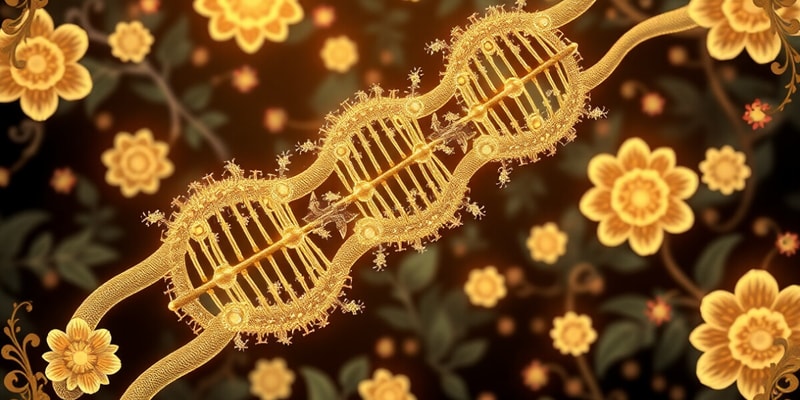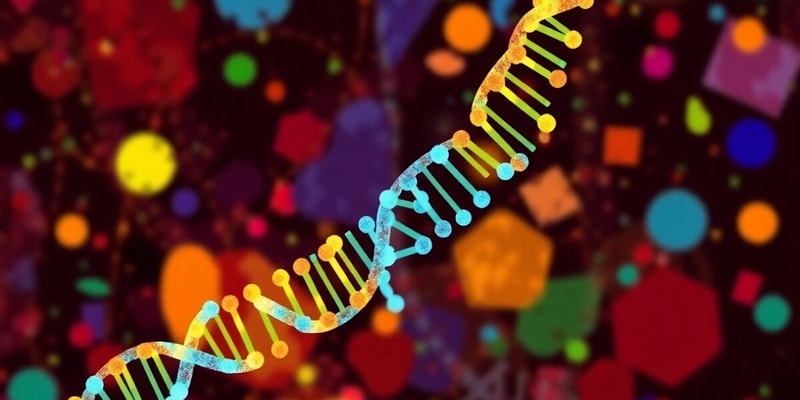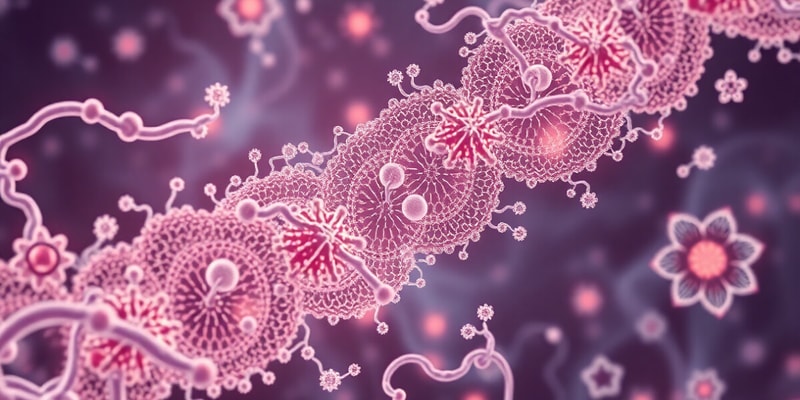Podcast
Questions and Answers
What distinguishes RNA from DNA in prokaryotic and eukaryotic systems?
What distinguishes RNA from DNA in prokaryotic and eukaryotic systems?
Which of the following best describes RNA polymerase (RNAP)?
Which of the following best describes RNA polymerase (RNAP)?
Which activity is NOT associated with RNA polymerase?
Which activity is NOT associated with RNA polymerase?
What is the primary function of kinesins and ribosomes in a biological context?
What is the primary function of kinesins and ribosomes in a biological context?
Signup and view all the answers
Why is the specificity of biological machines important?
Why is the specificity of biological machines important?
Signup and view all the answers
What forms the core enzyme of RNA polymerase?
What forms the core enzyme of RNA polymerase?
Signup and view all the answers
How does RNA polymerase contribute to the transcription process?
How does RNA polymerase contribute to the transcription process?
Signup and view all the answers
What role does proof-reading play in the function of RNA polymerase?
What role does proof-reading play in the function of RNA polymerase?
Signup and view all the answers
What role do Sigma factors play in prokaryotic transcription?
What role do Sigma factors play in prokaryotic transcription?
Signup and view all the answers
Why is it important to regulate gene expression in prokaryotes?
Why is it important to regulate gene expression in prokaryotes?
Signup and view all the answers
Which of the following statements about σ70 is correct?
Which of the following statements about σ70 is correct?
Signup and view all the answers
What function does the sigma factor σ38 (σS) serve?
What function does the sigma factor σ38 (σS) serve?
Signup and view all the answers
How do prokaryotes manage their gene expression under varying physiological conditions?
How do prokaryotes manage their gene expression under varying physiological conditions?
Signup and view all the answers
Which of the following is a potential consequence of expressing all genes at once in an organism?
Which of the following is a potential consequence of expressing all genes at once in an organism?
Signup and view all the answers
What is the significance of understanding protein regulation in biotechnology and pharmaceuticals?
What is the significance of understanding protein regulation in biotechnology and pharmaceuticals?
Signup and view all the answers
What defines the difference between an operon and a regulon?
What defines the difference between an operon and a regulon?
Signup and view all the answers
What is a significant difference between prokaryotic and eukaryotic transcription regarding the initiation process?
What is a significant difference between prokaryotic and eukaryotic transcription regarding the initiation process?
Signup and view all the answers
Which of the following correctly describes transcription factors in eukaryotic transcription?
Which of the following correctly describes transcription factors in eukaryotic transcription?
Signup and view all the answers
What is the potential mistake students commonly make regarding transcription and translation?
What is the potential mistake students commonly make regarding transcription and translation?
Signup and view all the answers
What does RNAP II refer to in the context of eukaryotic mRNA transcription?
What does RNAP II refer to in the context of eukaryotic mRNA transcription?
Signup and view all the answers
Which statement best explains why it is vital to distinguish between prokaryotic and eukaryotic transcription?
Which statement best explains why it is vital to distinguish between prokaryotic and eukaryotic transcription?
Signup and view all the answers
During which phase of prokaryotic transcription do transcription factors primarily function?
During which phase of prokaryotic transcription do transcription factors primarily function?
Signup and view all the answers
What is generally true of transcription in both prokaryotes and eukaryotes?
What is generally true of transcription in both prokaryotes and eukaryotes?
Signup and view all the answers
Which of the following best describes the role of elongation factors in transcription?
Which of the following best describes the role of elongation factors in transcription?
Signup and view all the answers
Study Notes
Prokaryotic Transcription
- Prokaryotic transcription occurs in the cytoplasm
- RNA polymerase unwinds DNA
- Nucleotides are added to the 3' end of the RNA strand
- RNA polymerase is a multi-protein complex
- The core enzyme includes 2α, β, β' subunits
- The holoenzyme includes the addition of a sigma factor
- The sigma factor is important for recognizing specific promoter sites
- Different sigma factors recognize different promoters (e.g., σ70, sigma38)
- Promoter regions contain -10 and -35 sequences
- Sequences like TATAAT (-10) and TTGACA (-35) are recognized by the σ factor
Revision Lectures
- The goal is to provide a different way to approach learning BIOL2010 topics such as DNA replication, repair, and transcription.
- The approach is applicable to all modules and helps independent learning.
- The lectures give an overview of the types of questions that will be asked in the exam, such as MCQs and SAQs.
- Exams have equally weighted parts: MCQs, short-answer questions (SAQs), and an essay.
- There are 40 compulsory MCQs
- Students can find example MCQs using Vevox
SAQ Example
- Each SAQ is marked out of 5, and half marks are acceptable (e.g., 3.5/5).
- Students must answer 9 out of 12 SAQs.
- MCQs, SAQs, and essays have equal weighting (1/3 each).
- Examples of SAQs include describing how RNAP recognizes the promoter site.
- Generic answers will only get minimal marks.
- The answers need sufficient information (at least 5 marks) for adequate demonstration.
Essay Question
- Essay questions are based on the lecturer's material from each lecture.
- Students are to select and complete one question.
- The essay's mark weight matches the MCQs and SAQs.
- Essays test depth of knowledge, while MCQs test breadth of knowledge and SAQs test both breadth and depth.
Prokaryotic Transcription Diagram
- Diagram of prokaryotic transcription shows DNA, mRNA, and ribosomes.
- Transcription occurs in the cytoplasm of prokaryotic cells.
- The diagram shows the relationship between prokaryotic and eukaryotic cell structures and processes.
Prokaryotic Transcription Review
- Two main differences between DNA and RNA apply to prokaryotic and eukaryotic systems:
- Backbone sugar component
- Thymine vs Uracil
RNA Polymerase Activities
- RNAP has multiple functional activities:
- Helicase (bubble formation)
- Polymerase (RNA formation)
- Proofreading
Structure of the RNAP Catalytic Centre
- Structural details of the active center of RNAP
- Interactions between DNA and RNAP
Specificity
- Specificity is crucial for all biological machines.
- The core enzyme and holoenzyme components contribute to RNAP specificity.
- Different sigma (σ) factors are responsible for recognizing specific promoters.
Sigma Factors and Promoters
- The sigma factor is critical in recognizing the promoter region of the gene.
- Promoters include specific sequences like -35 regions and -10 regions.
What comes after Specificity?
- Regulation of transcription is important because expressing all genes at once is inefficient and can be toxic.
- Regulation allows for responding to environmental changes (e.g., UV light).
How do prokaryotes regulate their gene expression?
- Some genes are constitutively expressed (always on), while others are regulated.
- Regulation involves positive and negative methods, such as operons.
- Operons are groups of genes regulated together.
What stops transcription?
- Stopping transcription is essential for regulating gene expression.
- The signals that trigger prokaryotic transcription termination mechanisms need to be identified.
- Distinguishing termination in prokaryotes and eukaryotes
Missing information
- The story of transcription, including initiation, elongation, and termination, is incomplete if some aspects are missing.
- The location and breakdown of mRNA are critical to complete the story.
Studying That Suits You
Use AI to generate personalized quizzes and flashcards to suit your learning preferences.
Related Documents
Description
This quiz covers key concepts of prokaryotic transcription relevant to the BIOL2010 course. Focus areas include the role of RNA polymerase, promoter sequences, and the significance of different sigma factors. Prepare effectively for exams by mastering these crucial topics.




